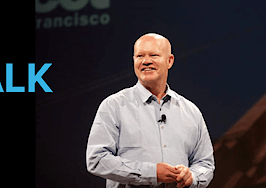- Re/Max has spent more than $100M this year buying back its master franchise regions, mostly recently in Georgia, Kentucky, Tennessee and southern Ohio.
- The franchisor gets to keep 100 percent of the franchise fees in its company-owned regions, which means that per-agent revenue in those regions is nearly three times greater than for independent regions.
- Re/Max's Dave Liniger says centralization makes the company more efficient.
Dave Liniger founded real estate franchisor Re/Max in January 1973 when there were no cell phones, fax machines were rare and the Internet had yet to be invented.
Liniger grew his company by selling master franchises across the country, giving independent entrepreneurs the right to sell and service new Re/Max franchisees for a cut of royalty fees, starting in 1977.
Regional Re/Max directors would help new franchisees open their doors, provide management advice, conduct quarterly sales meetings, set up training centers, purchase local media, hold local retreats and attend state Realtor conventions, Liniger told Inman.
Meanwhile, the Denver-based parent company provided the overall growth strategy, trademark protection and group purchasing, he said.
The strategy worked. Today, Re/Max has more than 111,000 agents, more than 62,000 of them spread across the U.S., and nearly 21,000 in Canada.
“[The independent master franchises] established us, got a regional presence, [grew] market share, and established a brand name in the area. It worked extremely well,” Liniger said.
A new buy-back strategy
At the time, Liniger’s strategy was common and seemed pretty savvy. But the downside was he gave away big chunk of his future value to bootstrap his business in the short-term.
Now, he is working hard to get some of it back with the help of Wall Street. The company went public in 2013 and is using those funds to buy back entire Re/Max regions.
In total, Re/Max has spent more than $100 million purchasing franchise rights this year. The strategy helps the regional owners get liquidity and a viable exit from the business.
“It’s very important for the regional owners when they do decide to exit the business that what they have created continues their legacy,” Liniger said.
“Re/Max LLC does it. We’re creating a succession plan … a continuity of their business plan. So it’s a natural evolution of businesses that are small, a good size, but limited in how much business they can get because they’ve got geographical limitations.”
For example, last week, the franchisor announced it had signed an agreement to purchase the master franchise for three independent regions — Georgia, Kentucky/Tennessee, and Southern Ohio — for about $50.4 million, according to a public filing.
The deal is expected to close by the end of 2016.

Dave Liniger
The regions were previously independently owned by Re/Max Regional Services, founded by Howard McPherson in 1978.
McPherson’s children have run the business over the past decade. That company will now become a subsidiary of Re/Max LLC.
Re/Max has more than 250 offices and nearly 4,000 agents in those three regions, according to a press release. Services for those agents won’t change, Liniger said.
But he does expect the change to make the company as a whole more efficient. With today’s technology, the company is able to offer resources from a central location.
Some of the services Re/Max provides from its national headquarters include hiring real estate coach Brian Buffini to speak to its agents at 10 to 15 meetings a year, buying TV advertising, and organizing two major conventions and three or four minor conventions per year, Liniger said.
This also means that if agents or brokers need a particular service — legal or financial advice, for instance — they’ll be able to get that service quickly because there won’t be just one person in charge of it, according to Liniger.
When you have centralization, everything doesn’t stop if someone goes on vacation, he said.
This year, Re/Max has also bought back or agreed to buy back the master franchise rights for New Jersey (for $45 million), New York ($8.5 million), and Alaska ($1.5 million), according to a public filing.
This brings the franchisor’s total number of U.S. company-owned regions to 18, encompassing about 80 percent of Re/Max’s 62,000 U.S. agents.
Ten North American regions remain independent, most of which the company plans to buy as their owners retire or otherwise leave the business.
Good for the bottom line
The change also boosts the company’s bottom line.
When it buys back a region, Re/Max takes on the overhead costs of servicing the region, but also gets 100 percent of the franchise fees, including a continuing franchise fee, broker fee, initial franchise fee and franchise renewal fee. (Re/Max already gets 100 percent of the $400 in annual dues that agents pay the company directly.)
“So it’s worth the investment to buy them out,” Liniger said.

Re/Max’s revenue streams as a percentage of 2015 total revenue, Source: SEC
In its third-quarter earnings call in November, Re/Max Chief Financial Officer Karri Callahan said, “It is important to note we received between 15 percent and 30 percent of fee revenue from independent regions.
“By acquiring a region, we capture the additional 70 percent to 85 percent of revenue generated by the region. That is why these acquisitions are so attractive and so accretive to our business.”
Re/Max’s average annual revenue per agent for its company-owned regions is nearly three times greater than for independent regions in those countries, and revenue per agent for regions outside the U.S. and Canada is even lower, the company said in its last quarterly report.
Re/Max broke down the fee differences in its 2015 earnings report, released in February:

2015 average annual revenue per agent in Re/Max owned vs. independent regions, Source: SEC
Editor’s note: The chart above is now slightly out of date because on July 1 the company implemented a $5.00 and $2.50 per month per agent increase in continuing franchise fees in its company-owned regions in the U.S. and Canada, respectively,
An exit strategy
Back when Re/Max first started selling master franchises, Liniger was in his 20s, but the buyers were in their 40s or 50s, he said. So as those original owners retire or succumb to health problems, the franchisor buys up the rights.
“We know how to run ’em. We have the financial resources. The master franchises are too small to go public and too big to be bought by a broker,” he said.
The original master franchise contracts had 20-year time limits, and the purchasers can renew indefinitely, according to Liniger.
Re/Max does allow independent master franchise owners to re-sell the rights, but their contracts preclude selling to title companies or lenders because Re/Max didn’t want master franchisors to be able to dictate to consumers which companies they could use for their home purchase, Liniger said.
Backed by personal relationships
Liniger noted that Re/Max competitors like Century 21, ERA Real Estate and Coldwell Banker had bought back all of their U.S. master franchises at least a decade ago, which has made Re/Max “kind of unique.”
He credits the difference to Re/Max going public in 2013, compared to rivals that went public decades ago. Going public “changes the personal relationships of people,” he said.
“The founders of this company are still involved over 44 years later,” which means they developed close relationships over time with the people that bought their master franchises, according to Liniger.
Over the decades, Re/Max staff and the master franchisors met four or five times a year, sharing marriages and divorces, kids’ milestones, health problems and other life events, he said.
“It’s been a hell of a ride. Not only have we succeeded as a company, we have succeeded as friends,” he said.
Re/Max doesn’t currently have its eye on other master franchise regions.
“They kind of come for sale when they come for sale. There might be two or three years when there aren’t any,” Liniger said.
“When it’s time to retire, they will approach us.”
All of Re/Max’s master franchises outside of North America are independent and the company has no plans to buy them back, Liniger said.
“The difficulty of running regions worldwide with the different government regulations, different languages, different accounting practices from [nearly 100 countries] makes it very difficult for a public company in the United States to operate that way,” he said.









